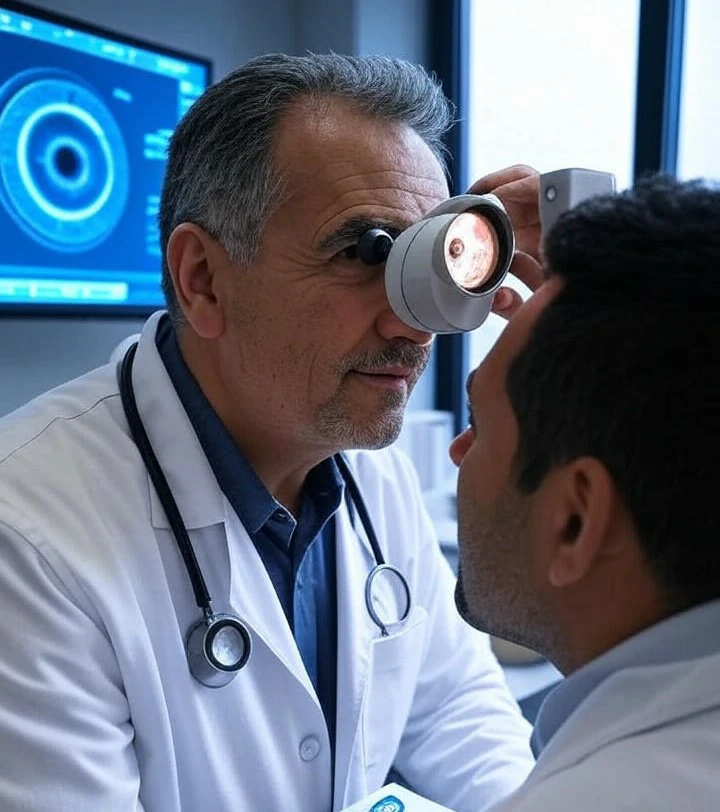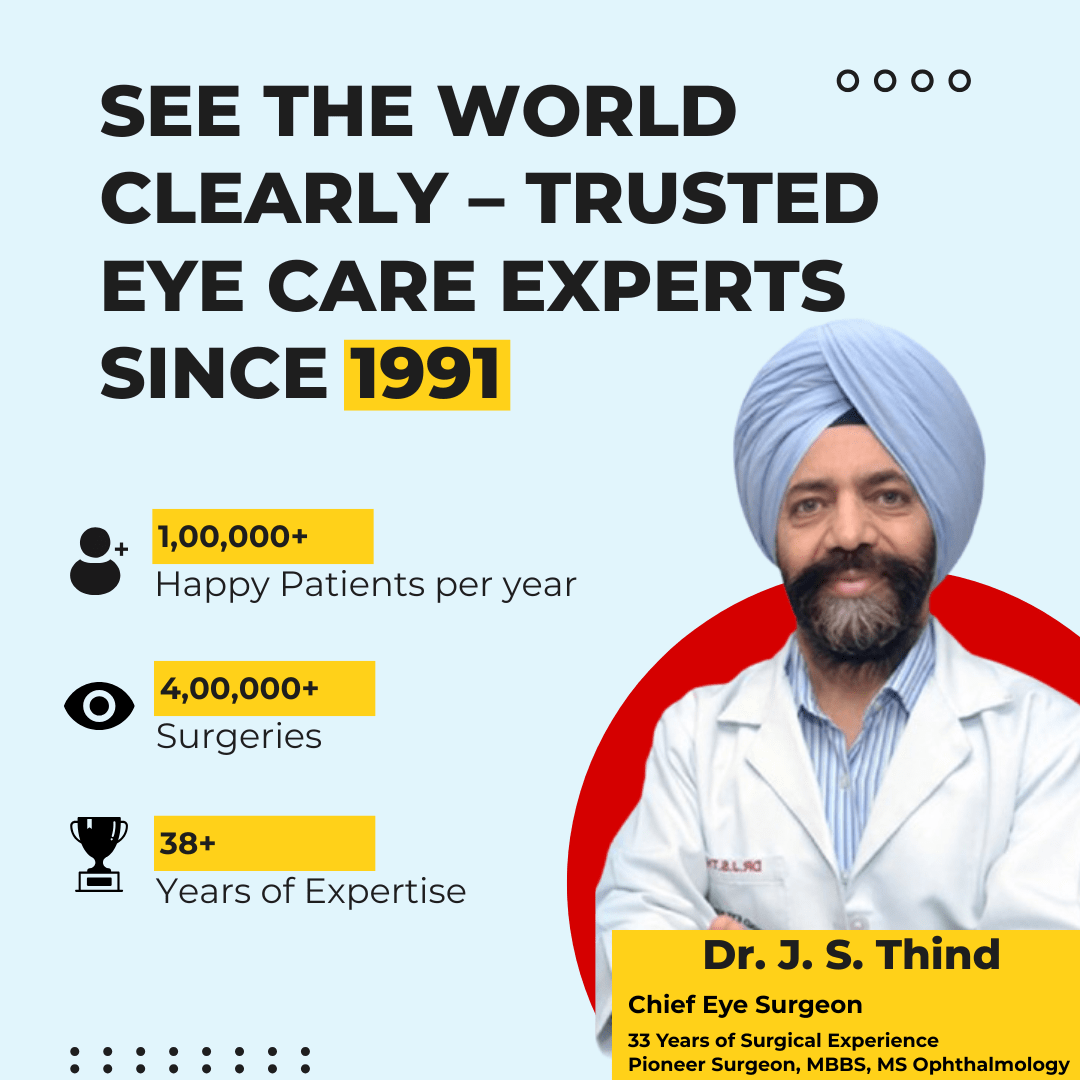Your family’s medical history plays a crucial role in determining your risk for various health conditions, including eye diseases. Many vision problems and serious eye conditions have a genetic component, meaning if someone in your family has been diagnosed with an eye disease, you may be at a higher risk of developing it. Understanding the family history of eye disease can help in early detection, prevention, and timely treatment.
At Thind Eye Hospital, we emphasize the importance of knowing your family’s eye health history to safeguard your vision and that of future generations. A proactive approach to managing the family history of eye disease is essential in preserving long-term visual health.

Understanding the Importance of Family History in Eye Health and Disease Prevention
Why Family History Matters in Eye Health
Genetics significantly influence eye health. While lifestyle factors such as diet, screen time, and UV exposure contribute to eye conditions, hereditary factors often determine susceptibility to diseases like glaucoma, macular degeneration, and retinal disorders. Having a family history of eye disease substantially increases your risk and makes regular monitoring essential.
If close family members, parents, siblings, or grandparents have had vision problems, it is essential to undergo regular eye checkups with a qualified ophthalmologist to monitor and manage potential risks related to the family history of eye disease.
- Common Genetic Eye Diseases: Several serious eye conditions are known to run in families. Recognizing them early can make a significant difference in treatment outcomes.
- Common Genetic Eye Diseases: Several serious eye conditions are known to run in families. Recognizing them early can make a significant difference in treatment outcomes.
- Glaucoma: Glaucoma is a leading cause of irreversible blindness, often developing silently until significant damage occurs. Individuals with a family history of eye disease like glaucoma have a four to nine times higher risk of developing the condition. Regular screenings and intraocular pressure tests are essential for early detection and management.
- Glaucoma: Glaucoma is a leading cause of irreversible blindness, often developing silently until significant damage occurs. Individuals with a family history of eye disease like glaucoma have a four to nine times higher risk of developing the condition. Regular screenings and intraocular pressure tests are essential for early detection and management.
- Age-Related Macular Degeneration (AMD): Macular degeneration affects central vision and is a primary cause of vision loss in older adults. Genetic factors contribute significantly to the likelihood of developing AMD, especially if a close relative has been diagnosed with it. If there’s a family history of eye disease, early diagnosis through retina exams can slow progression and improve quality of life.
- Age-Related Macular Degeneration (AMD): Macular degeneration affects central vision and is a primary cause of vision loss in older adults. Genetic factors contribute significantly to the likelihood of developing AMD, especially if a close relative has been diagnosed with it. If there’s a family history of eye disease, early diagnosis through retina exams can slow progression and improve quality of life.
- Diabetic Eye Disease: While diabetes itself has a genetic component, diabetic eye diseases such as diabetic retinopathy and macular edema can develop as complications. If diabetes runs in your family, annual eye screenings with a retina specialist can help detect and manage potential vision problems related to the family history of eye disease before they become severe.
- Diabetic Eye Disease: While diabetes itself has a genetic component, diabetic eye diseases such as diabetic retinopathy and macular edema can develop as complications. If diabetes runs in your family, annual eye screenings with a retina specialist can help detect and manage potential vision problems related to the family history of eye disease before they become severe.
- Retinitis Pigmentosa: A rare, inherited disorder, retinitis pigmentosa causes progressive loss of night vision and peripheral vision. Since this condition often starts at a young age, early genetic testing and specialized care can help slow down its progression, especially when there’s a known family history of eye disease.
- Retinitis Pigmentosa: A rare, inherited disorder, retinitis pigmentosa causes progressive loss of night vision and peripheral vision. Since this condition often starts at a young age, early genetic testing and specialized care can help slow down its progression, especially when there’s a known family history of eye disease.
- Cataracts: Though often associated with aging, cataracts can also have a genetic link. If your parents or grandparents developed cataracts at an early age, you may be predisposed. In cases involving a family history of eye disease, regular eye exams can help detect cataracts early and determine the right time for surgery.
- Cataracts: Though often associated with aging, cataracts can also have a genetic link. If your parents or grandparents developed cataracts at an early age, you may be predisposed. In cases involving a family history of eye disease, regular eye exams can help detect cataracts early and determine the right time for surgery.
How to Protect Your Vision if You Have a Family History of Eye Disease
While you cannot change your genetic makeup, you can take proactive steps to reduce the risk of developing hereditary eye diseases. A personalized strategy to manage your family history of eye disease can make a significant difference in outcomes.
Regular Eye Exams with an Ophthalmologist:
Early detection is key. A comprehensive eye exam at Thind Eye Hospital can help identify risk factors before symptoms appear. People with a family history of eye disease should have annual eye checkups, even if they have no vision complaints.
Lifestyle Adjustments for Vision Health:
Eat a Nutrient-Rich Diet: Include foods high in omega-3 fatty acids, lutein, zinc, and vitamin C to protect against vision loss.
Exercise Regularly: Helps control conditions like diabetes and hypertension, which affect eye health.
Quit Smoking: Smoking increases the risk of genetic eye diseases, particularly AMD and cataracts.
Protect Your Eyes from External Damage:
Wear Sunglasses: Choose UV-protected sunglasses to shield your eyes from harmful rays.
Limit Screen Time: Follow the 20-20-20 rule (every 20 minutes, look 20 feet away for 20 seconds) to reduce eye strain.
Use Safety Glasses: If you work in environments with dust, chemicals, or potential eye hazards, wear protective eyewear.
Monitor for Warning Signs:
If you experience blurry vision, difficulty seeing in low light, frequent headaches, or sudden vision loss, seek immediate medical attention. These could be early signs of a developing eye condition, especially if there’s a family history of eye disease.
The Role of Genetic Testing in Eye Care:
Advancements in medical science now allow for genetic testing to assess the likelihood of developing hereditary eye conditions. If your family has a history of eye disease, consulting a retina specialist at Thind Eye Hospital can help determine if genetic testing is right for you. This knowledge allows for personalized prevention strategies and better management of potential risks.
Book an Eye Checkup at Thind Eye Hospital
Understanding your family history of eye disease can help prevent vision loss and detect diseases early. At Thind Eye Hospital, our team of experienced ophthalmologists and retina specialists provides advanced diagnostic tools and personalized treatment plans to ensure optimal eye care.
Take control of your eye health today. Schedule an appointment at Thind Eye Hospital and protect your vision for the future.
Top 5 FAQs About Family History of Eye Disease
Q. Why is my family history important for my eye health?
Q. How often should I get an eye exam if eye disease runs in my family?
Q. Can eye diseases be prevented if they are genetic?
Q. Should I consider genetic testing for eye diseases?
Q. What should I do if I notice symptoms and have a family history of eye disease?


